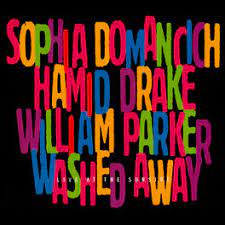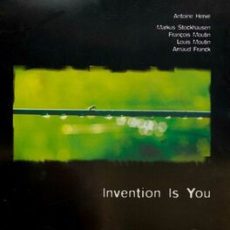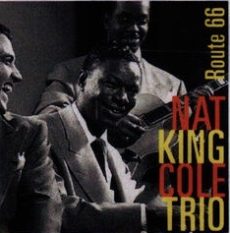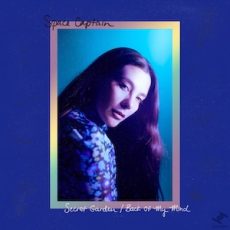
Daily Dose Of Jazz…
Sophia Domancich was born January 25, 1957 in Paris, France and began learning piano at the age of six. She attended the Conservatoire de Paris from 1968 to 1975 where she won first prize for piano and chamber music. She began her career as an accompanist in vocal and dance lessons, with the Paris Opera and the Théâtre de Caen.
In 1979 she met Steve Lacy, Bernard Lubat and Jean-Louis Chautemps who introduced her to the world of jazz and improvisation. By 1982 she formed a duet with Laurent Cugny and joined the big band Lumiére. She later participated in Quoi D’Neuf Docteur? with Steve Grossman, Glenn Ferris and Jack Walrath.
The following year during a brief collaboration with the group Anaïd, she met several English musicians from the Canterbury scene, drummer Pip Pyle, saxophonist Elton Dean and bassist Hugh Hopper, forming the group L’Equip Out in late 1984. The group included for a time a fifth member, Didier Malherbe on the flute and the tenor saxophone. In 1990, L’Equip Out recorded a second album, Up!, with bassist Paul Rogers.
With the latter and drummers Bruno Tocanne and Tony Levin, she formed the Sophia Domancich Trio with which she toured for eight years and recorded five studio albums. Also with Rogers, she created a 1995 quartet with the original composition, this time with two trumpeters, Patrick Fabert and Jean-François Canape.
Through the 1990s and into the new century, Domancich continued collaborating and recording with John Greaves and Vincent Courtois’ Trouble with Happiness, and with Simon Goubert. She was a pianist under Didier Levallet in the Orchester National de Jazz. In 2000 she formed the Quintet Pentacle, in 2006 the Trio DAG (Domancich, Avenel, Goubert) creating three albums as a trio and an album “free 4 DAG” with saxophonist Dave Liebman. Sophia ventured into electronic music, formed three more groups to continue to express herself through her music.
She became the first woman to receive the Prix Django Reinhardt from the Jazz Academy as French Musician of the Year. By 2007 found herself included in the French Ministry of Foreign Affairs and the Ministry of Culture collaborative book, 100 Jazz Titles, that included her 2002 Pentacle Quintet release.
She has recorded 10 albums as a leader, 7 as a co-leader and 20 as a member of other groups. Pianist and jazz composer Sophia Domancich continues to compose, explore, perform and reinvent herslf.
More Posts: bandleader,composer,history,instrumental,jazz,music,piano

Daily Dose Of Jazz…
Antoine Hervé was born on January 20, 1959 in Paris, France. He studied composition at the Conservatoire National Supérieur de Musique. Between 1987 and 1989 he was director of the French National Jazz Orchestra.
Next to musicals, soundtracks for movies and dance shows Hervé has composed a concert for trumpet and a piece for drums and orkest. During 1997 he and Markus Stockhausen founded a quintet.
Emerging as a gifted representative of his generation of improvisers, his delve into fusion music, European classical music, contemporary and modern jazz led him and 12 other musicians to form the group Bob 13. He would go on to create a trio with bassist Michel Benita and drummer Peter Gritz.
His influences have been Bill Evans, Wynton Kelly, Oscar Peterson and McCoy Tyner, as well as Chopin, Debussy and Bartok.
Pianist Antoine Hervé continues to explore the realm of jazz through his compositions and performance.
More Posts: bandleader,history,instrumental,jazz,music,piano

Daily Dose Of Jazz…
Charles Pervis Harris was born in Alexandria, Virginia and raised in Baltimore, Maryland on January 9, 1916. He studied violin before switching to bass in high school. He played professional dates while studying education at what is now Coppin State College. He went on to work at the Royal Theater in Baltimore after graduating.
Joining Lionel Hampton in 1941, he played with him for several years and was one of three bassists in Hampton’s ensemble, one of his bandmates being Charles Mingus. Harris did some recording with Dizzy Gillespie in the 1940s as well. Fatigued from touring he returned to Baltimore in 1949.
Soon after he worked in a band called Three Strikes and a Miss, again at the Royal Theater. While working there Nat King Cole heard him and asked him to join his trio. During his tenure with the vocalist, Charlie performed on some of Cole’s best-known tunes, such as Unforgettable, Route 66, It’s Only A Paper Moon, Sweet Lorraine and Mona Lisa. During the 1956-57 season he performed on Nat’s tv show on NBC.
After leaving the band he returned to Baltimore and remained there, playing, teaching, and working as a furniture salesman. Double bassist Charlie Harris died from cancer on September 9, 2003 at Bon Secours Hospital.
More Posts: bass,history,instrumental,jazz,music

Daily Dose Of Jazz…
Gray Hall was born November 10, 1992 in Philadelphia, Pennsylvania. Learning to play the guitar as a youth, by the time he was in high school he was playing lead with Nathaniel’s jazz quartet and with Donnie in their modern blues group called Edens Unknown.
He and his high school classmates Alex Plye and Mike Haldelman while working with Marilisa Cook-Simmons on vocals, creating an electro-future-soul odyssey that blends the art of soul, production, and instrumentation that demonstrates the art of cool.
After graduating from Guilford College in Greensboro, North Carolina he rejoined his fellow musicians Pyle and Haldeman to produce and record tracks for the neo-soul jazz group Space Captain. Splitting his time between performing and recording in New York City and recording at the Great Time Studio in suburban Philadelphia.
Other studio work by Hall features original beats and soundtrack mastering for So Far Productions (NYC). He has studied guitar with Daniel Sheriff, Greg Hyslip, and Rory Stewart; and interned as an studio production assistant with Eddie Motilla of Universal Studios, NYC and The Record Room in Miami, Florida.
Guitarist Gray Hall, who works in genres ranging from modern jazz, jazz fusion, modern blues, and neo-soul, continues to perform, record and produce.
More Posts: bandleader,guitar,history,instrumental,jazz,music,producer
Daily Dose Of Jazz…
Jan Bertil Allan was born November 7, 1934 in Falun, Sweden and began his career in 1951 as a pianist. After moving to Stockholm, Sweden he changed to the trumpet as his main instrument. At this time he played in Carl-Henrik Norin’s orchestra. In 1954 he worked with Lars Gullin and Rolf Billberg for a year followed by a four year residency starting in 1955 with Carl-Henrik Norin, shlie earning a PhD in physics.
He is considered among the most important modern jazz musicians in Sweden, despite his small number of records. For the first three years in the Sixties he led a quintet with Billberg. Throughout the decade Allan worked with Arne Domnérus, Georg Riedel, and Bengt Hallberg, among others. From 1968 to 1975, he was a member of the Swedish Radio Jazz Group.
His album Jan Allan-70, which featured Rolf Ericson, Nils Lindberg, Bobo Stenson, Jon Christensen, and Rune Gustafsson, won a Grammis Award for Jazz of the Year in 1970. His album Software, released in 1998, stands in strong affinity with the West Coast Jazz of Gerry Mulligan and Stan Getz.
Over the course of his career, he recorded albums with Alice Babs, Bosse Broberg, Benny Carter, Dorothy Donegan, Lars Gullin, Jan Johansson, Thad Jones, Roger Kellaway, Lee Konitz, Nils Lindberg, Georg Riedel, George Russell and Monica Zetterlund among others.
In 2009, he was honored with a Swedish Golden Django as a Master of Jazz. Trumpeter and composer Jan Allan, who recorded eight albums as a leader and composed for several films, continues to perform and compose.
Confer a dose of a Falun trumpeter to those seeking a greater insight about the musicians around the world who are members of the pantheon of jazz…
Jan Allan: 1934 | Trumpet, Composer
More Posts: bandleader,composer,history,instrumental,jazz,music,trumpet



